Charles E W Bean, Diaries, AWM38 3DRL 606/258/1 - 1914 - 1927 - Part 6
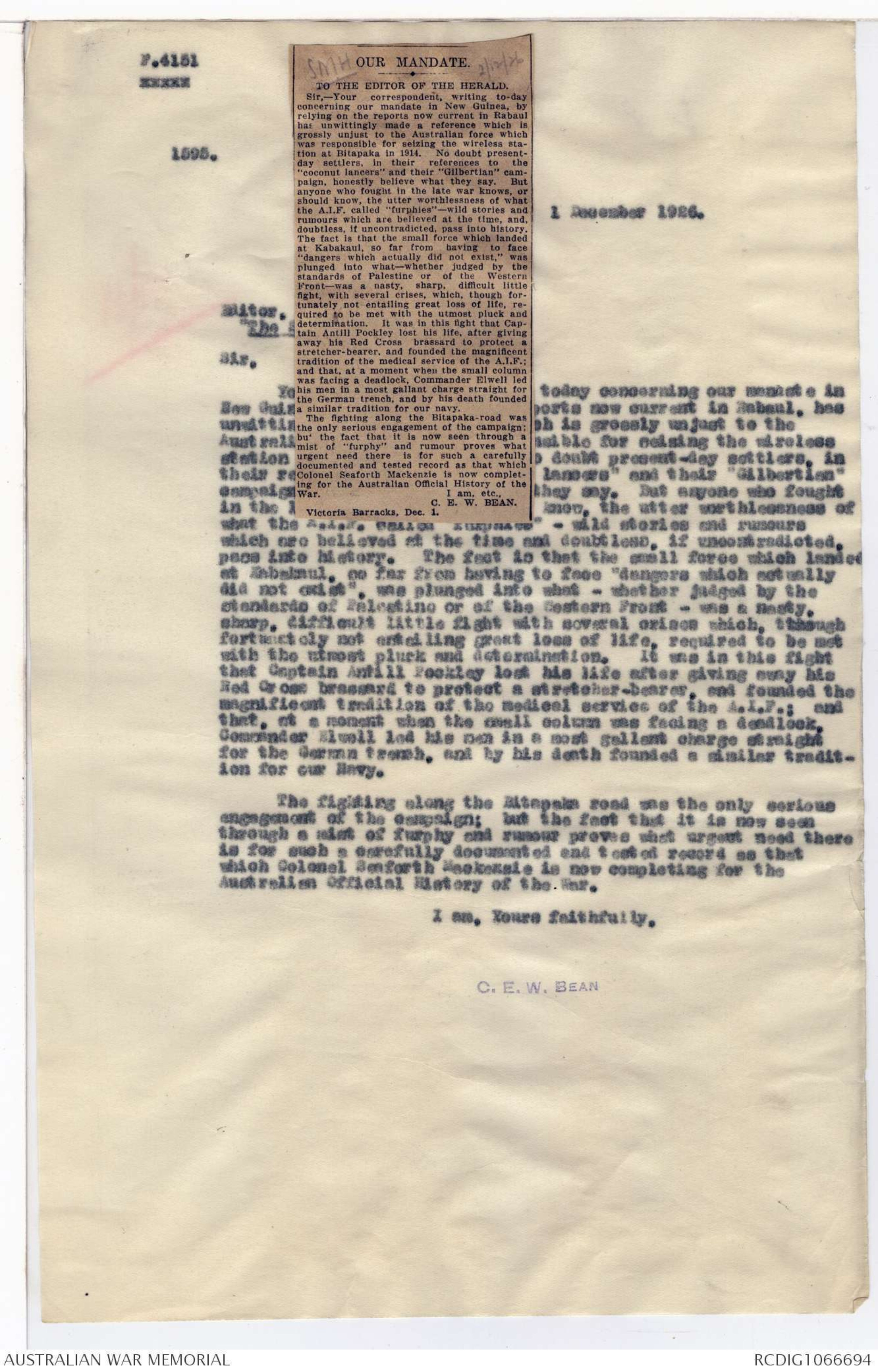
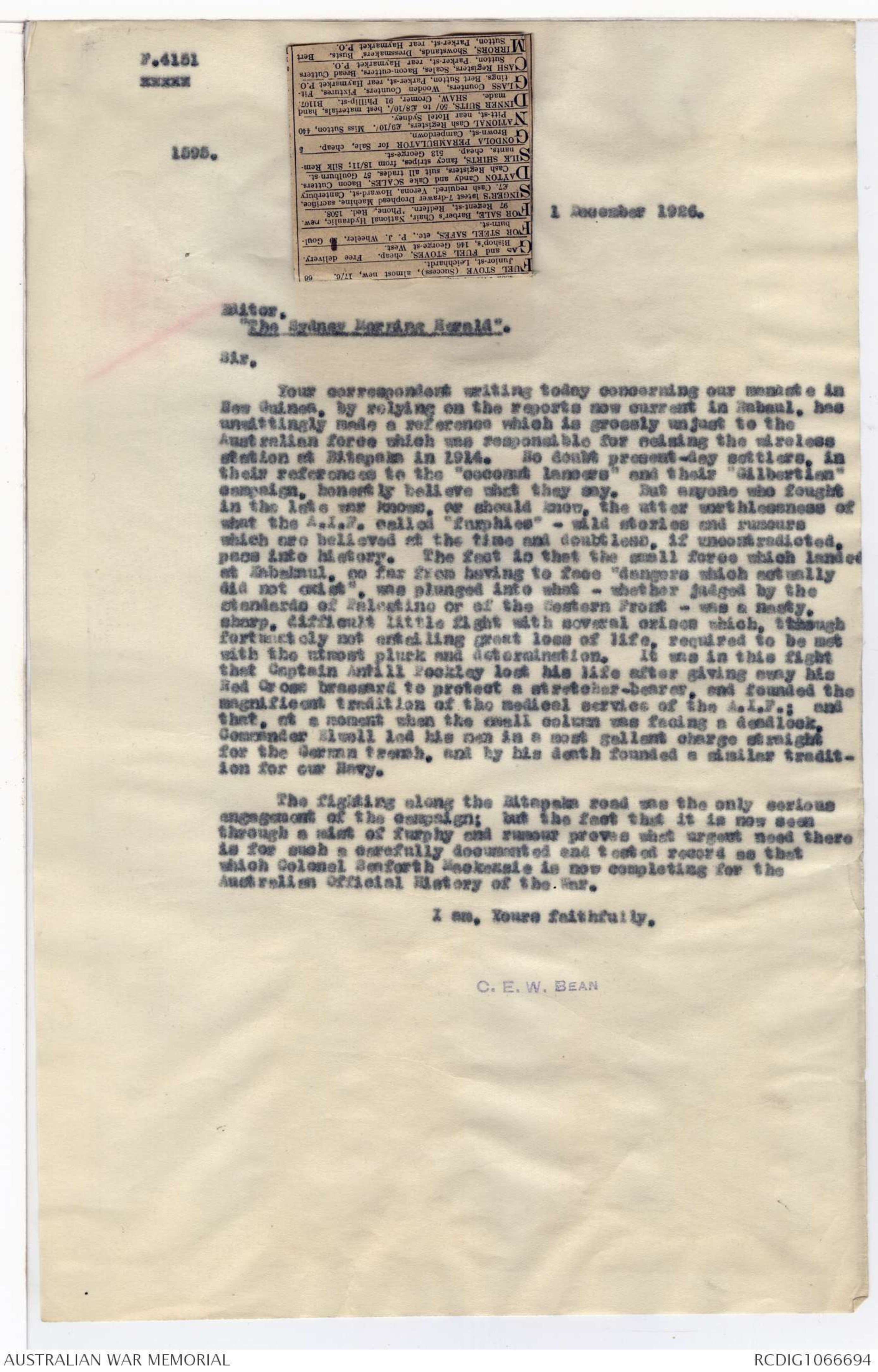
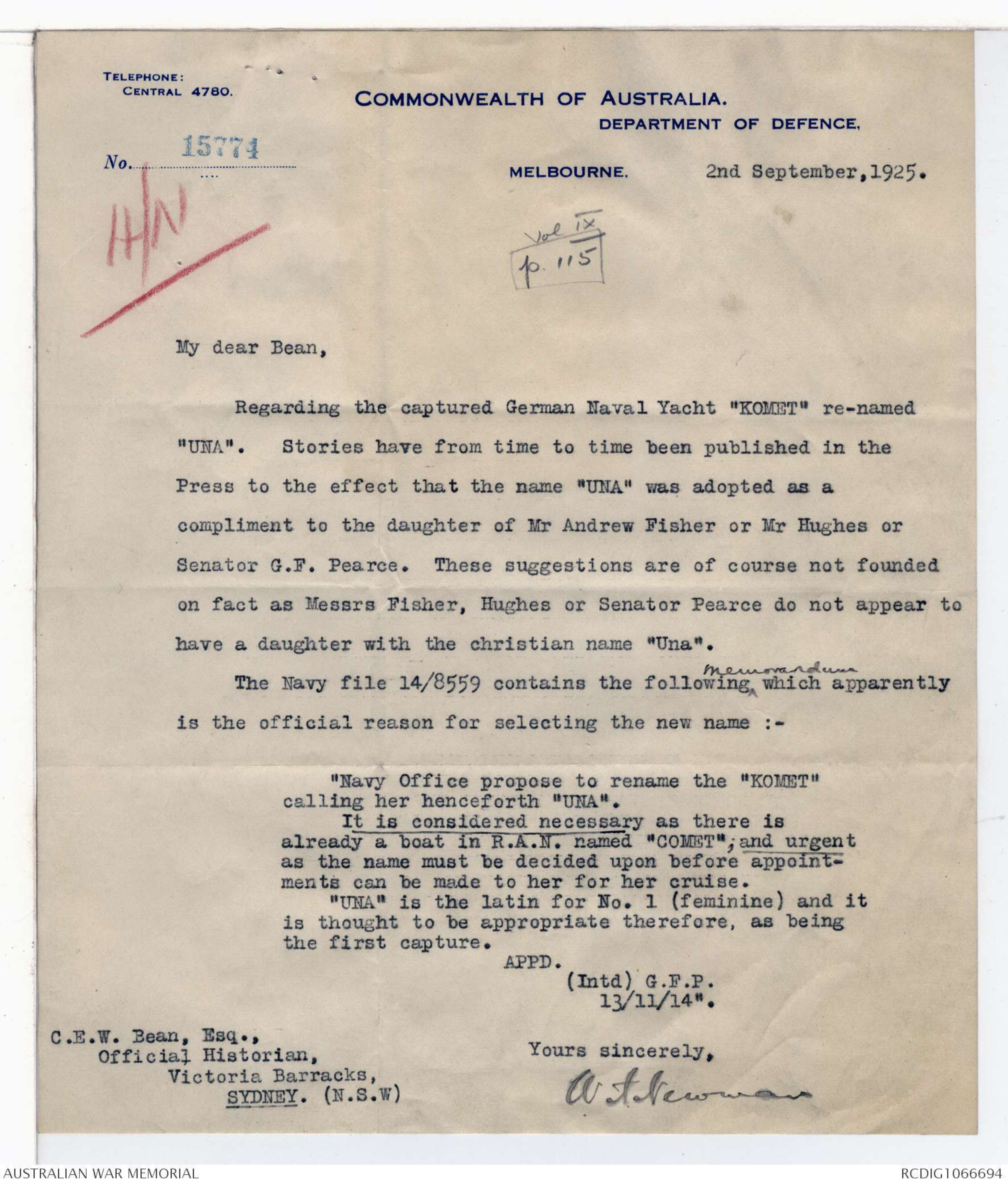
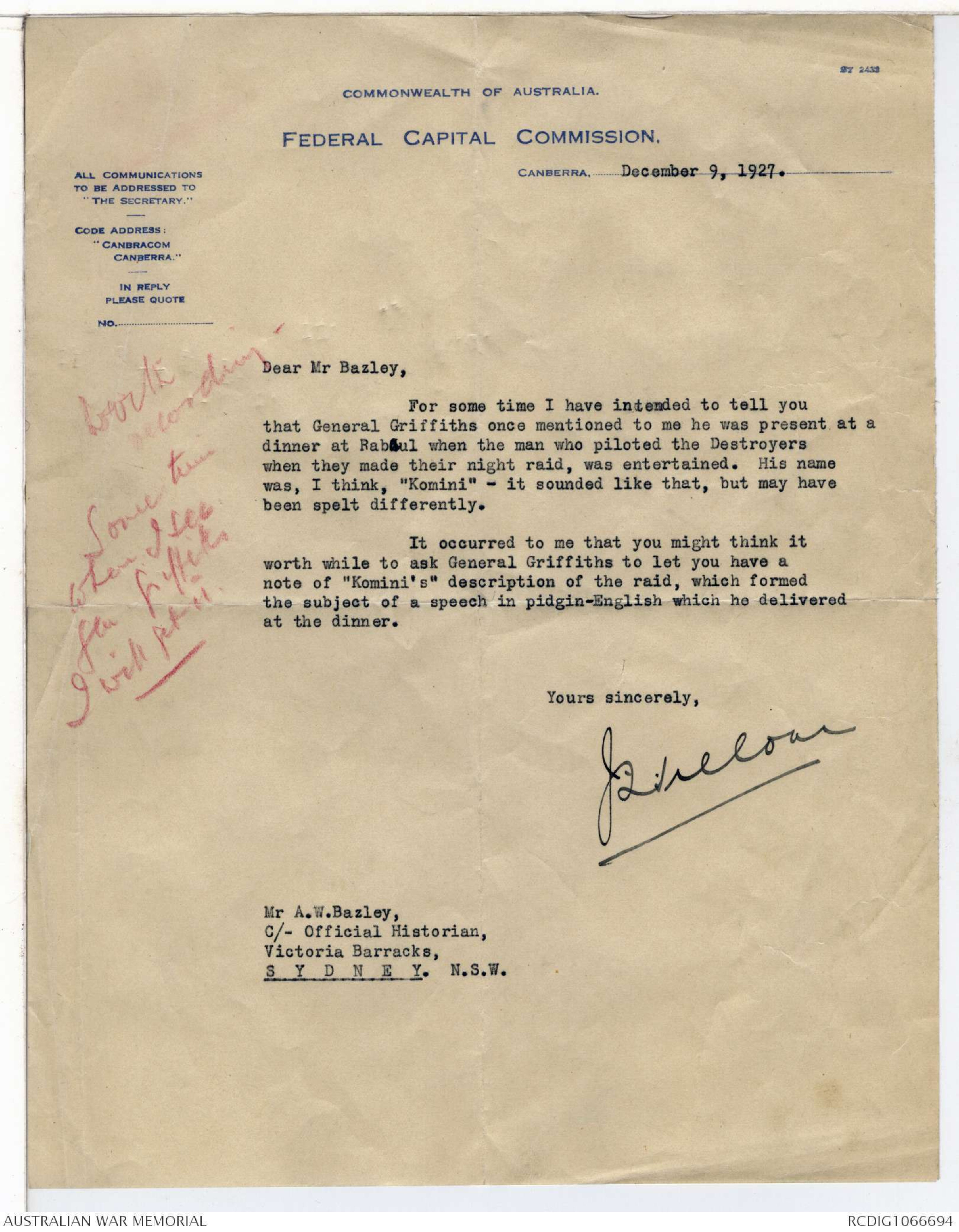
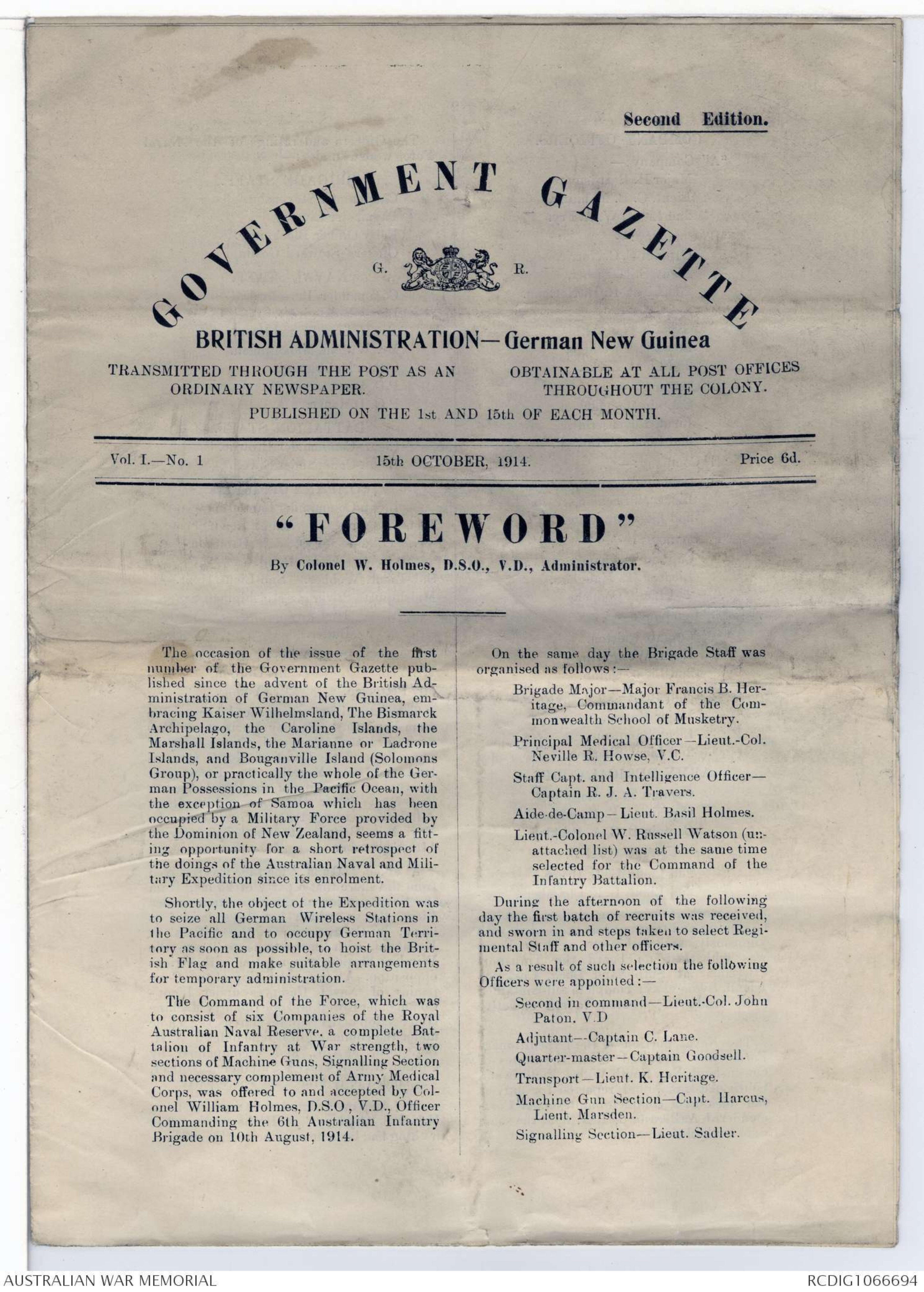
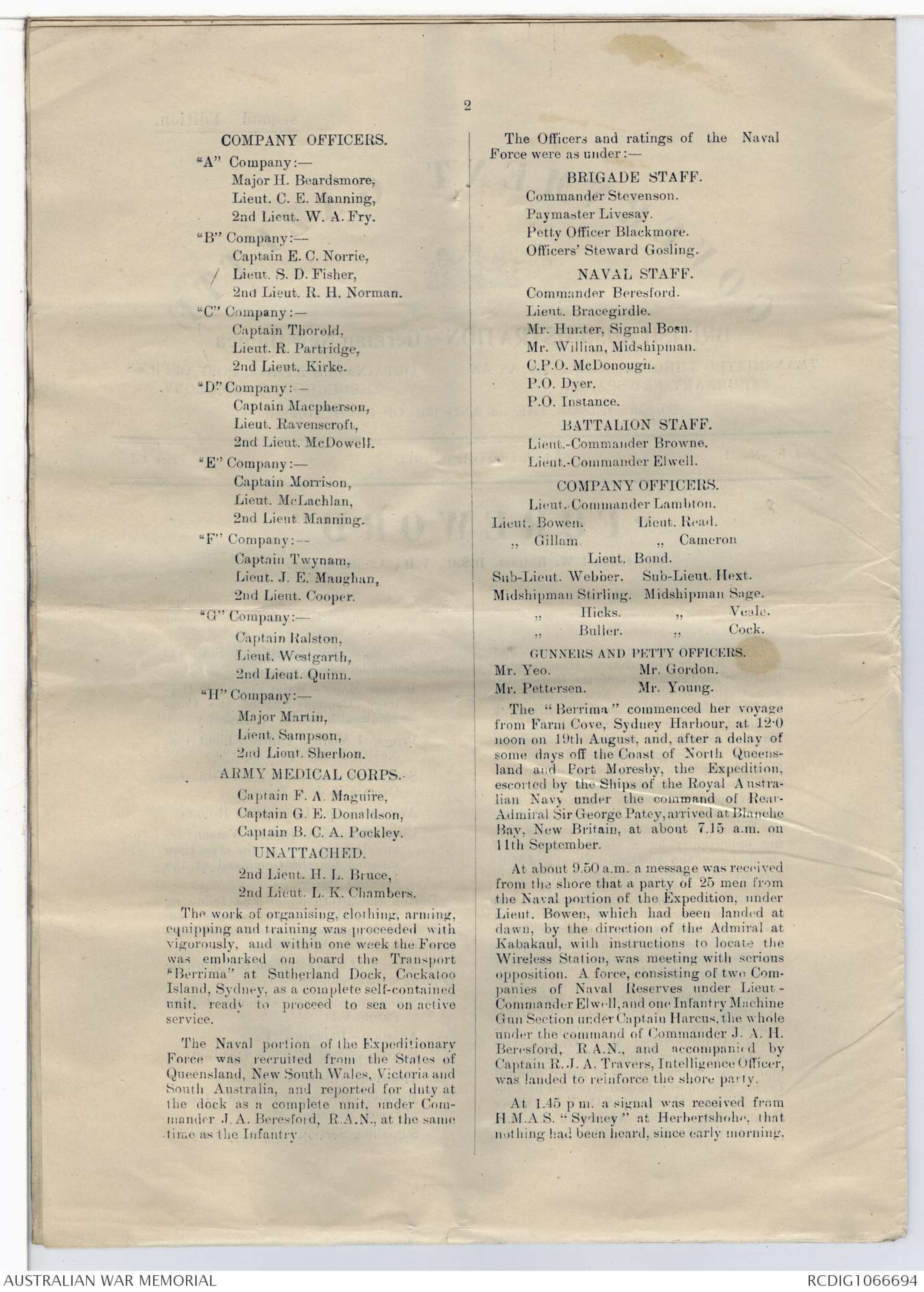
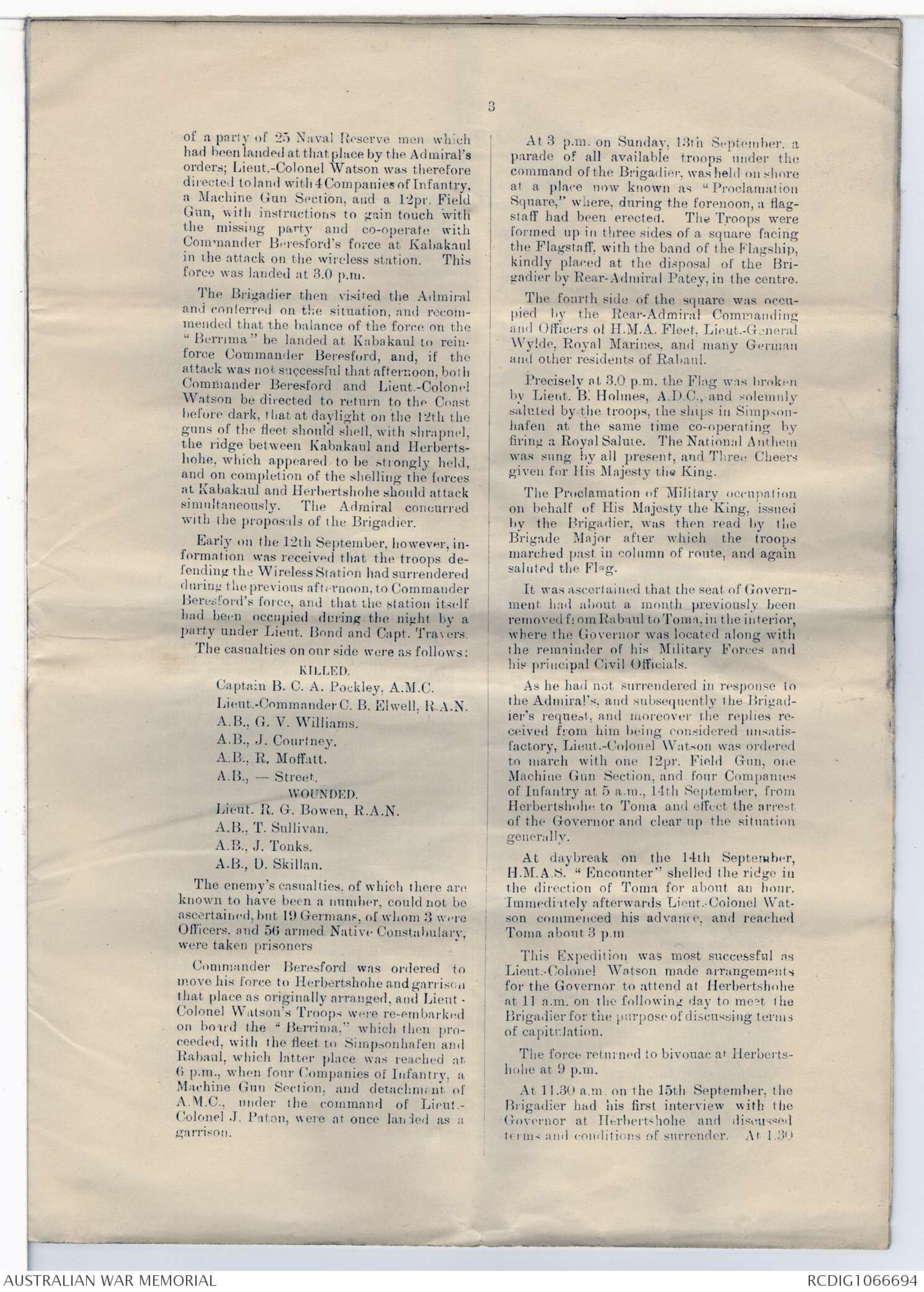
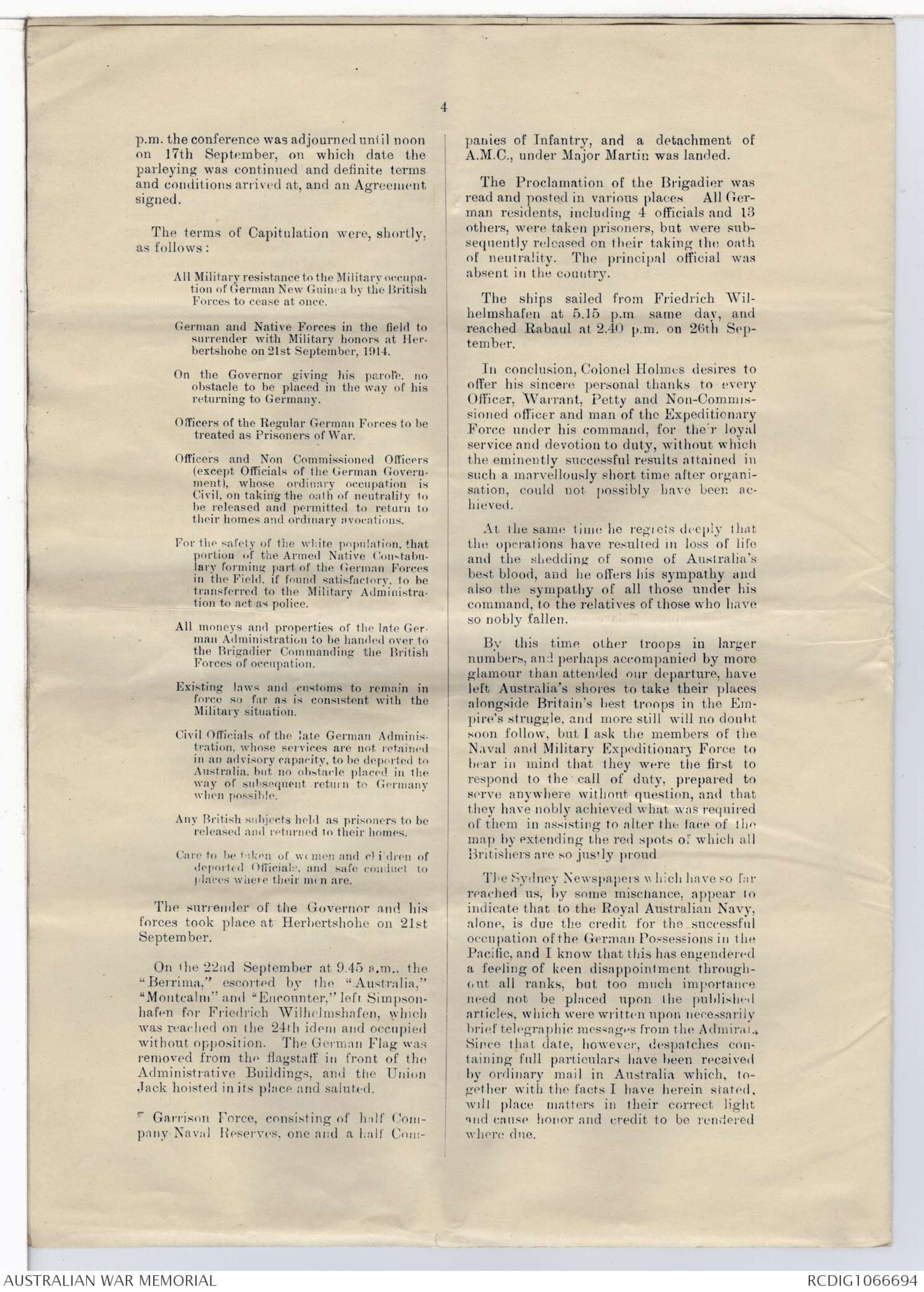
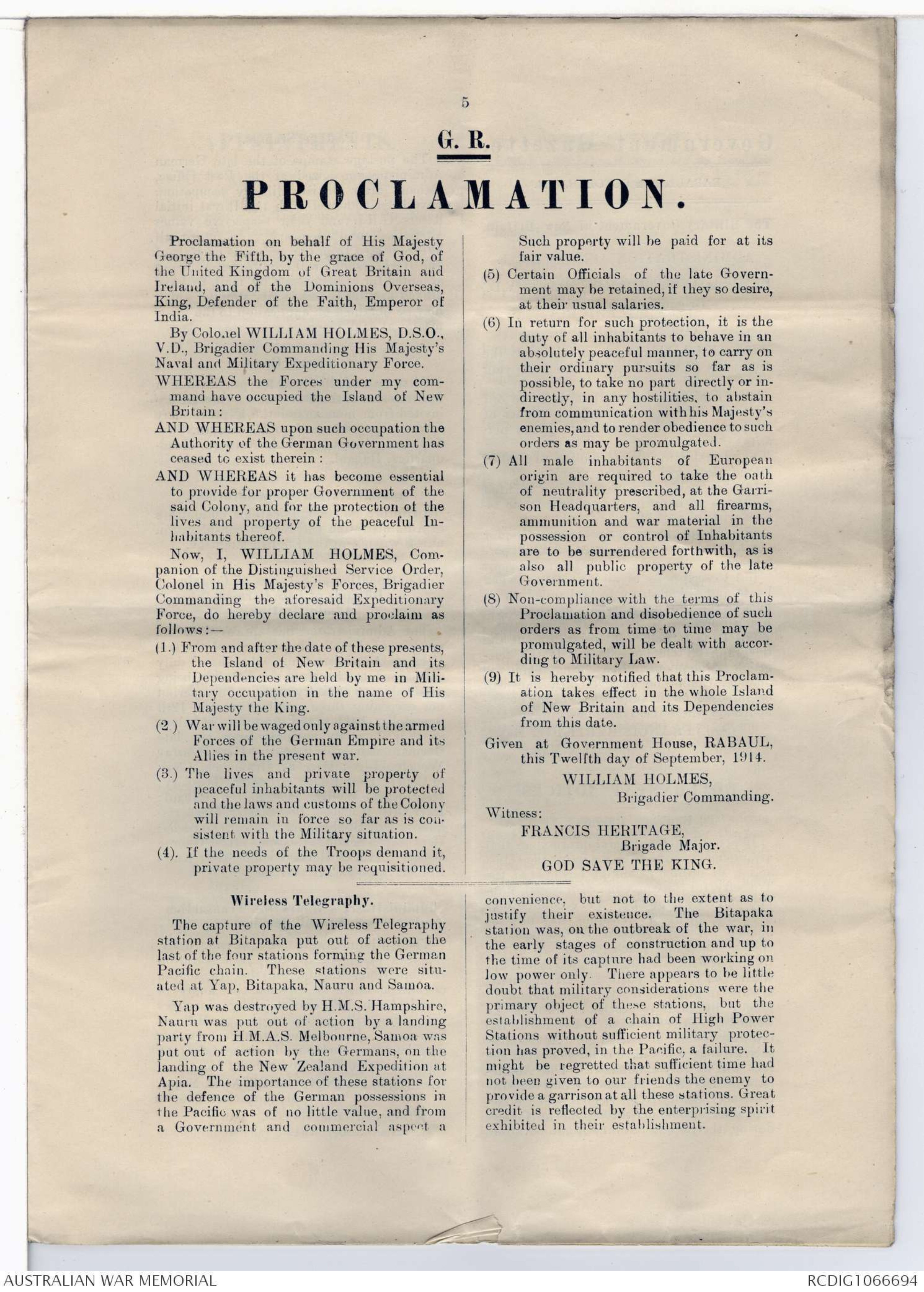
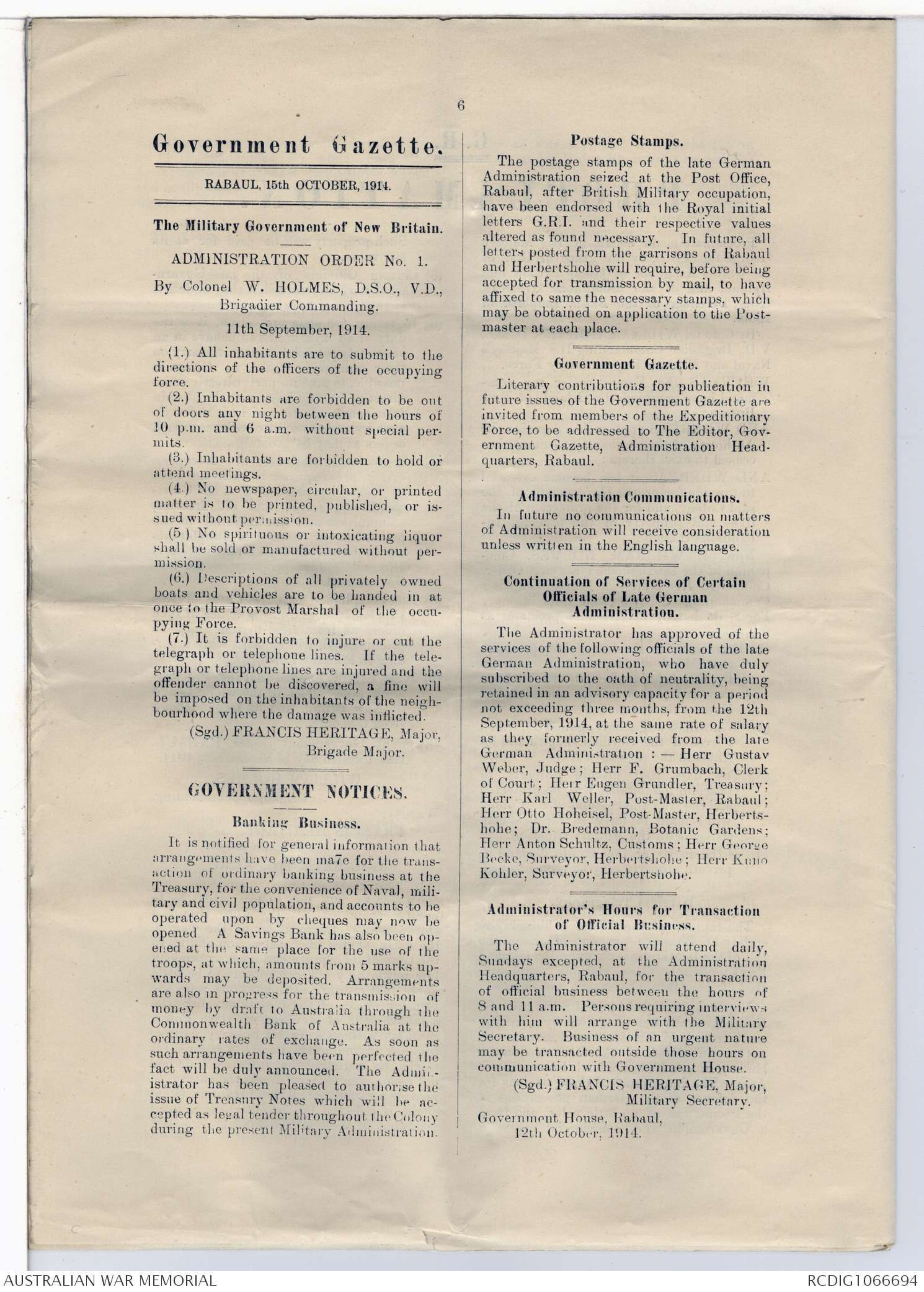
P.4151
1595.
[*SMH*] OUR MANDATE. [*2/12/26*]
TO THE EDITOR OF THE HERALD.
Sir.—Your correspondent, writing to-day
concerning our mandate in New Guinea,by
relying on the reports now current in Rabaul
has unwittingly made a reference which is
grossly unjust to the Australian force which
was responsible for seizing the wireless station at Bitapaka in 1914. No doubt present day settlers, in their references to the "coconut lancers" and their "Gilbertian" campaign, honestly believe what they say. But anyone who fought in the late war knows, or should know, the utter worthlessness of what the A.I.F. called “furphies" - wild stories and, rumours which are believed at the time, and doubtless, if uncontradicted, pass into history.
The fact is that the small force which landed
at Kabakaul, so far from having to face
“dangers which actually did not exist,” was
plunged into what—whether judged by the
standards of Palestine or of the Western
Front—was a nasty, sharp. difficult little
fight, with several crises, which, though fortunately not entailing great loss of life, required to be met with the utmost pluck and determination. It was in this fight that Captain Antill Pockley lost his life, after giving
away his Red Cross brassard to protect a
stretcher-bearer, and founded the magnificent
tradition of the medical service of the A.I.F.;
and that, at a moment when the small column
was facing a deadlock, Commander Elwell led
his men in a most gallant charge straight for
the German trench, and by his death founded
a similar tradition for our navy.
The fighting along the Bitapaka-road was
the only serious engagement of the campaign
but the fact that it is now seen through a
mist of "furphy" and rumour proves what
urgent need there is for such a carefully
documented and tested record as that which
Colonel Seaforth Mackenzie is now completing
for the Australian Official History of the War.
I am, Yours faithfully,
C.E. W. BEAN.
Victoria Barracks, Dec. 1.
F.4151
xxxxx
1595.
[* FUEL STOVE (Success), almost new 17/0 66
-----------------------------------------------------------
GAS and FUEL STOVE, cheap. Free Delivery
Bishop's, 146 George-st West.
------------------------------------------------------------
FOR STEEL SAFES, etc., P.J, Wheeler, Goulburn-st,
------------------------------------------------------------
FOR SALE, Barber's Chair, National Hydraulic, new
97 Regent-st, Redfern. Phone Red 1508.
-------------------------------------------------------------
SINGER'S latest 7-drawer Drophead Machine, sacrifice
£7, Cash required. Verona, Howard-st, Canterbury
------------------------------------------------------------
DAYTON Candy and Cake SCALES, Bacon Cutters,
Cash Required, suit all trades, 57 Goulburn-st.
------------------------------------------------------------
SILK SHIRTS, fancy stripes, from 18/11; Silk Remnants
cheap, 518 George-st.
------------------------------------------------------------
GONDOLA PERAMBULATOR for Sale, cheap. 5
Brown-st, Campertown.
------------------------------------------------------------
NATIONAL Cash Register, £9/10, Miss Sutton, 440
Pitt-st, near Hotel Sydney.
--------------------------------------------------------------
DINNER SUITS, 50. to €8/10/, best materials, hand
made. SHAW, Cromer, 19 Phillip-st, B1107
-------------------------------------------------------------
GLASS Counters, Wooden Counters, Fixtures, Fittings,
Best Sutton, Parker-st, rear Haymarket P.O
--------------------------------------------------------------
CASH Registers, Scales, Bacon-cutters, Bread Cutters
Sutton, Parker-st, rear Haymarket P.O.
-----------------------------------------------------------------
MIRRORS, Showstands, Dressmakers' Busts, Bert
Sutton, Parker-st, rear Haymarket P.O.
*] 1 December 1926
Editor,
"The Sydney Morning Herald".
Sir,
Your correspondent writing today concerning our mandate in New Guinea, by relying on the reports now current in Rabaul, has unwittingly made a reference which is grossly unjust to the Australian force which was responsible for seizing the wireless station at Bitapain in 1914. No doubt present-day settlers, in their references to the "coconut lancers" and their "Gilbertian" campaign, honestly believe what they say. But anyone who fought in the late ware knows, or should know, the utter worthlessness of what the A.I.F. called "furphies" - wild stories and rumours which are believed at the time and doubtless, if uncontradicted, pass into history. The fact to that the small force which landed at Kabalnul, so far from having to face "dangers which not really did not exist", was plunged what - whether judged by the standards of Palestine or of the Eastern Front - was a nasty, sharp, difficult little fight with several crises which, though fortunately not entailing great loss of life, required to be met with the utmost pluck and determination. It was in this fight that Captain Antill Pockley lost his life after giving away his Red Cross brassard to protectg a stretcher-bearer, and founded the significnat tradition of the medical service of the A.I.F.; and that, at a moment when the small column was facing a deadlock, Commander Elwell led his men in a most gallant charge straight for the German trench, and by his death founded a similar tradition for our Navy.
The fighting along the Bitaphan road ws the only serious engagement of this campaign; but the fact that it is not seen through a mist of furphy and rumour proves what urgent need there is for such a carefully documented and tested record as that which Colonel Benforth Mackenzie is now completing for the Australian Official History of the War
I am, Yours faithfully,
C.E.W. BEAN
TELEPHONE:
CENTRAL 4780.
COMMONWEALTH OF AUSTRALIA.
DEPARTMENT OF DEFENCE,
No. 15774
MELBOURNE.
2nd September, 1925.
[*H/N*] [* Vol IX fo. 115*]
My dear Bean,
Regarding the captured German Naval Yacht "KOMET" re-named "UNA". Stories have from time to time been published in the Press to the effect that the name "UNA" was adopted as a compliment to the daughter of Mr Andrew Fisher or Mr Hughes or Senator G.F. Pearce. These suggestions are of course not founded on fact as Messrs Fisher, Hughes or Senator Pearce do not appear to
have a daughter with the christian name "Una".
The Navy file 14/8559 contains the following, ∧ memorandum which apparently is the official reason for selecting the new name :-
"Navy Office propose to rename the "KOMET"
calling her henceforth "UNA".
It is considered necessary as there is
already a boat in R.A.N. named "COMET", and urgent
as the name must be decided upon before appoint¬
ments can be made to her for her cruise.
"UNA" is the latin for No. 1 (feminine) and it
is thought to be appropriate therefore, as being
the first capture.
APPD.
(Intd) G.F.P
13/21/14".
C.E.W. Bean, Esq.,
Yours sincerely,
Official Historian
Victoria Barracks
SYDNEY. (N.S.W)
FEDERAL CAPITAL COMMISSION
ALL COMMUNICATIONS
TO BE ADDRESSED TO
THE SECRETARY." CANBERRA December 9, 1927.
---
CODE ADDRESS:
“CANBRACOM
CARBERRA."
---
IN REPLY
PLEASE QUOTE
NO....
[* Work Country *]
[* Sometimes when I see flu sufferers I will get ill *]
Dear Mr Bazley,
For some time I have intended to tell you that General Griffiths once mentioned to me he was present at a
dinner at Rabaul when the man who piloted the Destroyers when they made their night raid, was entertained. His name was, I think, "Komini" - it sounded like that, but may have been spelt differently.
It occurred to me that you might think it worth while to ask General Griffiths to let you have a note of "Komini's“ description of the raid, which formed the subject of a speech in pidgin-English which he delivered at the dinner.
Yours sincerely,
Mr A.W.Bazley,
C/- Official Historian,
Victoria Barracks,
S Y D N E Y. N.S.W.
Second Edition.
GOVERNMENT GAZETTE
BRITISH ADMINISTRATION— German New Guinea
TRANSMITTED THROUGH THE POST AS AN ORDINARY NEWSPAPER
OBTAINABLE AT ALL POST OFFICES THROUGHOUT THE COLONY.
PUBLISHED ON THE Ist AND 15th OF EACH MONTH.
Vol. I.—No. 1
Price 6d.
15th OCTOBER, 1914.
"FOREWORD"
By Colonel W. Holmes, D.S.O., V.D., Administrator.
The occasion of the issue of the first number of the Government Gazette published since the advent of the British Administration of German New Guinea, embracing Kaiser Wilhelmsland, The Bismarck Archipelago, the Caroline Islands, the Marshall Islands, the Marianne or Ladrone Islands, and Bouganville Island (Solomons Group), or practically the whole of the German Possessions in the Pacific Ocean, with the exception-of Samoa which has been occupied by a Military Force provided by the Dominion of New Zealand, seems a fitting opportunity for a short retrospect of the doings of the Australian Naval and Military Expedition since its enrolment.
Shortly, the object of the Expedition was to seize all German Wireless Stations in the Pacific and to occupy German Territory as soon as possible, to hoist the Brit¬
ish Flag and make suitable arrangements for temporary administration.
The Command of the Force, which was to consist of six Companies of the Royal Australian Naval Reserve. a complete Battalion of Infantry at War strength, two sections of Machine Guns, Signalling Section and necessary complement of Army Medical Corps, was offered to and accepted by Colonel William Holmes, D.S.O, V.D., Officer Commanding the 6th Australian Infantry Brigade on 10th August, 1914.
On the same day the Brigade Staff was organised as follows:
Brigade Major—Major Francis B. Heritage, Commandant of the Commonwealth School of Musketry.
Principal Medical Officer—Lieut.-Col. Neville R. Howse, V.C.
Staff Capt. and Intelligence Officer - Captain R. J. A. Travers.
Aide-de-Camp- Lieut. Basil Holmes.
Lient.-Colonel W. Russell Watson (unattached list) was at the same time selected for the Command of the Infantry Battalion.
During the afternoon of the following day the first batch of recruits was received, and sworn in and steps taken to select Regimental Staff and other officers.
As a result of such selection the following Officers were appointed:-
Second in command—Lient.-Col. John Paton. V.D
Adjutant—Captain C. Lane.
Quarter-master— Captain Goodsell.
Transport —Lieut. K. Heritage.
Machine Gun Section—Capt. Harcus, Lient. Marsden.
Signalling Section—Lieut. Sadler.
COMPANY OFFICERS.
“A” Company:—
Major H. Beardsmore,
Lieut. C. E. Manning,
2nd Lieut. W. A. Fry.
"B” Company:—
Captain E. C. Norrie,
/ Lieut. S. D. Fisher,
2nd Lieut. R. H. Norman.
“C” Company:—
Captain Thorold,
Lieut. R. Partridge,
2nd Lieut. Kirke.
D' Company:—
Captain Maepherson,
Lieut. Ravenscroft,
2nd Lieut. McDowell.
E’ Company:—
Captain Morrison,
Lieut. McLachlan,
2nd Lient. Manning.
"F" Company:—
Captain Twynam,
Lieut. J. E. Maughan,
2nd Lieut. Cooper.
"G" Company:—
Captain Ralston,
Lieut. Westgarth,
2nd Lieut. Quinn.
"H” Company:—
Major Martin,
Lient. Sampson,
2nd Liout. Sherbon.
ARMY MEDICAL CORPS.-
Captain F. A. Maguire,
Captain G. E. Donaldson,
Captain B. C. A. Pockley.
UNATTACHED.
2nd Lient. H. L. Bruce,
2nd Lieut. L. K. Chambers.
The work of organising, clothing, arming, equipping and training was proceeded with vigorously, and within one week the Force was embarked on board the Transport
*Berrima” at Sutherland Dock, Cockatoo Island, Sydney, as a complete self-contained unit, ready to proceed to sea on active service.
The Naval portion of the Expeditionary Force was recruited from the States of Queensland, New South Wales, Victoria and South Australia, and reported for duty at the dock as a complete unit, under Commander J.A. Beresford, R.A.N., at the same time as the Infantry.
The Officers and ratings of the Naval Force were as under:-
BRIGADE STAFF.
Commander Stevenson.
Paymaster Livesay.
Petty Officer Blackmore.
Officers’ Steward Gosling.
NAVAL STAFF.
Commander Beresford.
Lient. Bracegirdle.
Mr. Hunter, Signal Bosn.
Mr. Willian, Midshipman.
C.P.O. McDonougii.
P.O. Dyer.
P.O. Instance.
BATTALION STAFF.
Lient.-Commander Browne.
Lieut.-Commander Elwell.
COMPANY OFFICERS.
Lieut.-Commander Lambton.
Lieut. Read.
Lieut. Bowen.
" Cameron
" Gillam.
Lieut. Bond.
Sub-Lieut. Hext.
Sub-Lieut. Webber.
Midshipman Sage.
Midshipman Stirling.
" Veale.
" Hicks.
" Cock.
" Buller.
GUNNERS AND PETTY OFFICERS.
Mr. Gordon.
Mr. Yeo.
Mr. Pettersen.
Mr. Young.
The “Berrima” commenced her voyage from Farm Cove, Sydney Harbour, at 12•0 noon on 19th August, and, after a delay of some days off the Coast of North Queensland and Port Moresby, the Expedition, escorted by the Ships of the Royal Australian Navy under the command of Rear Admiral Sir George Patey, arrived at Blanche Bay, New Britain, at about 7.15 a.m. on 11th September.
At about 9.50 a.m. a message was received from the shore that a party of 25 men from the Naval portion of the Expedition, under Lient. Bowen, which had been landed at dawn, by the direction of the Admiral at Kabakaul, with instructions to locate the Wireless Station, was meeting with serious opposition. A force, consisting of two Companies of Naval Reserves under Lieut. Commander Elwell,and one Infantry Machine Gun Section under Captain Harcus, the whole under the command of Commander J. A. H. Beresford, R.A.N., and accompanied by Captain R.J. A. Travers, Intelligence Officer, was landed to reinforce the shore party.
At 1.45 p m. a signal was received from H.M.A.S. “Sydney” at Herbertshohe, that nothing had been heard, since early morning,
of a party of 25 Naval Reserve men which had been landed at that place by the Admiral's orders; Lieut.-Colonel Watson was therefore directed toland with 4 Companies of Infantry, a Machine Gun Section, and a 12pr. Field Gun, with instructions to gain touch with the missing party and co-operate with Commander Beresford's force at Kabakaul in the attack on the wireless station. This force was landed at 3.0 p.m.
The Brigadier then visited the Admiral and conferred on the situation, and recommended that the balance of the force on the “ Berrima” be landed at Kabakaul to reinforce Commander Beresford, and, if the attack was not suçcessful that afternoon, both Commander Beresford and Lieut.-Colonel Watson be directed to return to the Coast before dark, that at daylight on the 12th the guns of the fleet should shell, with shrapnel, the ridge between Kabakaul and Herbertshohe, which appeared to be strongly held, and on completion of the shelling the forces at Kabakaul and Herbertshohe should attack simultaneously. The Admiral concurred with the proposals of the Brigadier.
Early on the 12th September, however, information was received that the troops defending the Wireless Station had surrendered during the previous afternoon, to Commander Beresford's force, and that the station itself had been occupied during the night by a party under Lieut. Bond and Capt. Travers.
The casualties on our side were as follows:
KILLED.
Captain B. C. A. Pockley, A.M.C.
Lient.-Commander C. B. Elwell, R.A.N.
A.B., G. V. Williams.
A.B., J. Courtney.
A.B., R. Moffatt.
A.B., — Street.
WOUNDED.
Lient. R. G. Bowen, R.A.N.
A.B., T. Sullivan.
A.B., J. Tonks.
A.B., D. Skillan.
The enemy’s casualties, of which there are known to have been a number, could not be ascertained, but 19 Germans, of whom 3 were Officers, and 56 armed Native Constabulary, were taken prisoners
Commander Beresford was ordered to move his force to Herbertshohe and garrison that place as originally arranged, and Lient-Colonel Watson s Troops were re-embarked on board the “ Berrima, which then proceeded, with the fleet to Simpsonhafen and Rabaul, which latter place was reached at 6 p.m., when four Companies of Infantry Machine Gun Section, and detachment of A.M.C., under the command of Lieut.¬
Colonel J. Paton, were at once landed as a garrison.
At 3 p.m. on Sunday, 13th September. a parade of all available troops under the command of the Brigadier, was held on shore at a place now known as “Proclamation Square, where, during the forenoon, a flagstaff had been erected. The Troops were formed up in three sides of a square facing the Flagstaff, with the band of the Flagship, kindly placed at the disposal of the Brigadier by Rear-Admiral Patey, in the centre.
The fourth side of the square was occupied by the Rear-Admiral Commanding and Officers ot H.M.A. Fleet, Lieut.-General Wylde, Royal Marines, and many German and other residents of Rabaul.
Precisely at 3.0 p.m. the Flag was broken by Lient. B. Holmes, A.D.C., and solemnly saluted by the troops, the ships in Simpsonhafen at the same time co-operating by firing a Royal Salute. The National Anthem was sung by all present, and Three Cheers given for His Majesty the King.
The Proclamation of Military occupation on behalf of His Majesty the King, issued by the Brigadier, was then read by the Brigade Major after which the troops marched past in column of route, and again saluted the Flag.
It was ascertained that the seat of Government had about a month previously been removedfrom Rabaul to Toma, in the interior, where the Governor was located along with the remainder of his Military Forces and his principal Civil Officials.
As he had not surrendered in response to the Admiral's, and subsequently the Brigadier's request, and moreover the replies received from him being considered unsatisfactory, Lieut.-Colonel Watson was ordered to march with one 12pr. Field Gun, one Machine Gun Section, and four Companies of Infantry at 5 a.m., 14th September, from Herbertshohe to Toma and effect the arrest of the Governor and clear up the situation generally.
At daybreak on the 14th September, H.M.A.S. “ Encounter” shelled the ridge in the direction of Toma for abont an hour. Immediately afterwards Lient.-Colonel Watson commenced his advance, and reached Toma about 3 p.m
This Expedition was most successful as Lieut.-Colonel Watson made arrangements for the Governor to attend at Herbertshohe at 11 a.m. on the following day to meet the Brigadier for the purpose of discussing terms of capitulation.
The force returned to bivouac at Herbertshohe at 9 p.m.
At 11.30 a.m. on the 15th September, the Brigadier had his first interview with the Governor at Herbertshohe and discussed terms and conditions of surrender. At 1.30
p.m. the conference was adjourned until noon on 17th September, on which date the parleying was continued and definite termsm and conditions arrived at, and an Agreement signed.
The terms of Capitulation were, shortly, as follows:
All Military resistance to the Military occupation of German New Guinea by the British Forces to cease at once.
German and Native Forces in the field to surrender with Military honors at Herbertshohe on 21st September, 1914.
On the Governor giving his parole. no obstacle to be placed in the way of his returning to Germany.
Officers of the Regular German Forces to be treated as Prisoners of War.
Officers and Non Commissioned Officers (except Officials of the German Government), whose ordinary occupation is Civil, on taking the oath of neutrality to be released and permitted to return to their homes and ordinary avocations.
For the safety of the white population, that portion of the Armed Native Constabulary forming part of the German Forces in the Field, if found satisfactory, to be transferred to the Military Administration to act as police.
All moneys and properties of the late German Administration to be handed over to the Brigadier Commanding the British Forces of occupation.
Existing laws and customs to remain in force so far as is consistent with the Military situation.
Civil Officials of the late German Administration, whose services are not retained in an advisory capacity, to be deported to Australia, but no obstacle placed in the way of subsequent return to Germany when possible.
Any British subjects held as prisoners to be released and returned to their homes.
Care to be taken of women and children of deported Officials, and safe conduct to places where their men are.
The surrender of the Governor and his forces took place at Herbertshohe on 21st September.
On the 22nd September at 9.45 a.m., the Berrima,” escorted by the “Australia,' "Montcalm” and “Encounter,” left Simpsonhafen for Friedrich Wilhelmshafen, which was reached on the 24th idem and occupied without opposition. The German Flag was removed from the flagstaff in front of the Administrative Buildings, and the Union Jack hoisted in its place and saluted.
Garrison Force, consisting of half Company-Naval Reserves, one and a half Companies of Infantry, and a detachment of A.M.C., under Major Martin was landed.
The Proclamation of the Brigadier was read and posted in various places All German residents, including 4 officials and 13 others, were taken prisoners, but were subsequently released on their taking the oath of neutrality. The principal official was absent in the country.
The ships sailed from Friedrich Wilhelmshafen at 5.15 p.m same dav, and reached Rabaul at 2.40 p.m. on 26th September.
In conclusion, Colonel Holmes desires to offer his sincere personal thanks to every Officer, Warrant, Petty and Non-Commissioned officer and man of the Expeditionary Force under his command, for their loyal service and devotion to duty, without which the eminently successful results attained in such a marvellously short time after organisation, could not possibly have been achieved.
At the same time he regrets deeply that the operations have resulted in loss of life and the shedding of some of Australia's best blood, and he offers his sympathy and also the sympathy of all those under his command, to the relatives of those who have so nobly fallen.
By this time other troops in larger numbers, and perhaps accompanied by more glamour than attended our departure, have left Australia's shores to take their places
alongside Britain’s best troops in the Empire’s struggle, and more still will no doubt soon follow, but I ask the members of the Naval and Military Expeditionary Force to
bear in mind that they were the first to respond to the call of duty, prepared to serve anywhere without question, and that they have nobly achieved what was required of them in assisting to alter the face of the
map by extending the red spots of which all Britishers are so justly proud.
The Sydney Newspapers which have so far reached us, by some mischance, appear to indicate that to the Royal Australian Navy alone, is due the credit for the successful
occupation of the German Possessions in the Pacific, and I know that this has engendered a feeling of keen disappointment throughout all ranks, but too much importance need not be placed upon the published articles, which were written upon necessarily brief telegraphic messages from the Admiral. Since that date, however, despatches containing full particulars have been received by ordinary mail in Australia which, together with the facts I have herein stated, will place matters in their correct light and cause honor and credit to be rendered where due.
G. R.
PROCLAMATION.
Proclamation on behalf of His Majesty George the Fifth, by the grace of God, of the United Kingdom of Great Britain and reland, and of the Dominions Overseas, King, Defender of the Faith, Emperor of India.
By Colonel WILLIAM HOLMES, D.S.O., V.D., Brigadier Commanding His Majesty’s Naval and Military Expeditionary Force.
WHEREAS the Forces under my command have occupied the Island of New Britain:
AND WHEREAS upon such occupation the Authority of the German Government has ceased to exist therein :
AND WHIEREAS it has become essential to provide for proper Government of the said Colony, and for the protection of the lives and property of the peacesul Inhabitants thereof.
Now, I, WILLIAM HOLMES, Companion of the Distinguished Service Order, Colonel in His Majesty’s Forces, Brigadier Commanding the aforesaid Expeditionary Force, do hereby declare and proclaim as follows:—
(1.) From and after the date of these presents, the Island of New Britain and its Dependencies are held by me in Military occupation in the name of His Majesty the King.
(2) War will be waged only against the armed Forces of the German Empire and its Allies in the present war.
(3.) The lives and private property of peaceful inhabitants will be protected and the laws and customs of the Colony will remain in force so far as is consistent with the Military situation.
(4). If the needs of the Troops demand it, private property may be requisitioned.
Wireless Telegraphy.
The capture of the Wireless Telegraphy station at Bitapaka put out of action the last of the four stations forming the German Pacific chain. These stations were situated at Yap, Bitapaka, Nauru and Samoa.
Yap was destroyed by H.M.S. Hampshire, Nauru was put out of action by a landing party from H.M.A.S. Melbourne, Samoa was put out of action by the Germans, on the landing of the New Zealand Expedition at Apia. The importance of these stations for the defence of the German possessions in the Pacific was of no little value, and from a Government and commercial aspect a convenience, but not to the extent as to justify their existence. The Bitapaka station was, on the outbreak of the war, in the early stages of construction and up to the time of its capture had been working on low power only. There appears to be little doubt that military considerations were the primary object of these stations, but the establishment of a chain of High Power Stations without sufficient military protection has proved, in the Pacific, a failure. It might be regretted that sufficient time had not been given to our friends the enemy to provide a garrison at all these stations. Great credit is reflected by the enterprising spirit exhibited in their establishment.
Such property will be paid for at its fair value.
(5) Certain Officials of the late Government may be retained, if they so desire, t their usual salaries.
(6) In return for such protection, it is the duty of all inhabitants to behave in an absolutely peaceful manner, to carry on their ordinary pursuits so far as is possible, to take no part directly or indirectly, in any hostilities, to abstain from communication with his Majesty's enemies, and to render obedience to such orders as may be promulgated.
(7) All male inhabitants of European origin are required to take the oath of neutrality prescribed, at the Garrison Headquarters, and all firearms, ammunition and war material in the possession or control of Inhabitants are to be surrendered forthwith, as is aso all public property of the late Government.
(8) Non-compliance with the terms of this Proclamation and disobedience of such orders as from time to time may be promulgated, will be dealt with according to Military Law.
(9) It is hereby notified that this Proclamation takes effect in the whole Island of New Britain and its Dependencies from this date.
Given at Government House, RABAUL,
this Twelfth day of September, 1914.
WILLIAM HIOLMES
Brigadier Commanding.
Witness:
FRANCIS HERITAGE.
Brigade Major.
GOD SAVE THE KING.
6
Government Gazette.
RABAUL, 15th OCTOBER, 1914.
The Military Government of New Britain.
ADMINISTRATION ORDER No. 1.
By Colonel W. HOLMES, D.S.O., V.D.,
Brigadier Commanding.
11th September, 1914.
(1.) All inhabitants are to submit to the directions of the officers of the occupying force.
(2.) Inhabitants are forbidden to be out of doors anv night between the hours of 10 p.m. and 6 a.m. without special permits.
(3.) Inhabitants are forbidden to hold or attend meetings.
(4.) No newspaper, circular, or printed matter is to be printed, published, or issued without permission.
(5) No spirituous or intoxicating liquor shall be sold or manufactured without permission.
(6.) Descriptions of all privately owned boats and vehicles are to be handed in at once to the Provost Marshal of the occupying Force.
(7.) It is forbidden to injure or cut the telegraph or telephone lines. If the telegraph or telephone lines are injured and the offender cannot be discovered, a fine will be imposed on the inhabitants of the neighbourhood where the damage was inflicted.
(Sgd.) FRANCIS HERITAGE, Major,
Brigade Major.
GOVERNMENT NOTICES.
Banking Business.
It is notified for general information that arrangements have been ma7e for tlie transaction of ordinary banking business at the Treasury, for the convenience of Naval, military and civil population, and accounts to be operated upon by cheques may now be opened A Savings Bank has also been opened at thie same place for the use of the troops, at which, amounts from 5 marks upwards may be deposited. Arrangements are also in progress for the transmission of money by draft to Australia through the Commonwealth Bank of Australia at the ordinary rates of exchange. As soon as such arrangements have been perfected the fact will be duly announced. The Administrator has been pleased to authorise the issue of Treasury Notes which will be accepted as legal tender throughout the Colony during the present Military Administration
Postage Stamps.
The postage stamps of the late German Administration seized at the Post Office.
Rabaul, after British Military occupation, have been endorsed with the Royal initial letters G.R.I. und their respective values altered as found necessary In future, all letters posted from the garrisons of Rabaul and Herbertshole will require, before being accepted for transmission by mail, to have affixed to same the necessary stamps, which may be obtained on application to thie Postmaster at each place.
Government Gazette.
Literary contributions for publication in future issues of the Government Gazette are invited from members of the Expeditionary Force, to be addressed to The Editor, Government Gazette, Administration Headquarters, Rabaul.
Administration Communications.
In future no communications on matters of Administration will receive consideration unless written in the English language.
Continuation of Services of Certain
Officials of Late German
Administration.
The Administrator has approved of the services of the following officials of the late German Administration, who have duly subscribed to the oath of neutrality, being retained in an advisory capacity for a period not exceeding three months, from the 12th September, 1914, at the same rate of salary as they formerly received from the late German Administration : — Herr Gustav Weber, Judge; Herr F. Grumbach, Clerk of Court; Herr Engen Grundler, Treasury; Herr Karl Weller, Post-Master, Rabaul; Herr Otto Hoheisel, Post-Master, Herbertshohe; Dr. Bredemann, Botanic Gardens; Herr Anton Schultz, Customs; Herr George Becke, Surveyor, Herbertshohe; Herr Kuno Kohler, Surveyor, Herbertshohe.
Administrator's Hours for Transaction
of Official Business.
The Administrator will attend daily, Sundays excepted, at the Administration Headquarters, Rabaul, for the transaction of official business between the hours of 8 and 11 a.m. Persons requiring interviews with him will arrange with the Military Secretary. Business of an urgent nature may be transacted outside those hours on communication with Government House.
(Sgd.) FRANCIS HERITAGE, Major,
Military Secretary.
Government House, Rabaul,
12th October, 1914.
 Sam scott
Sam scottThis transcription item is now locked to you for editing. To release the lock either Save your changes or Cancel.
This lock will be automatically released after 60 minutes of inactivity.